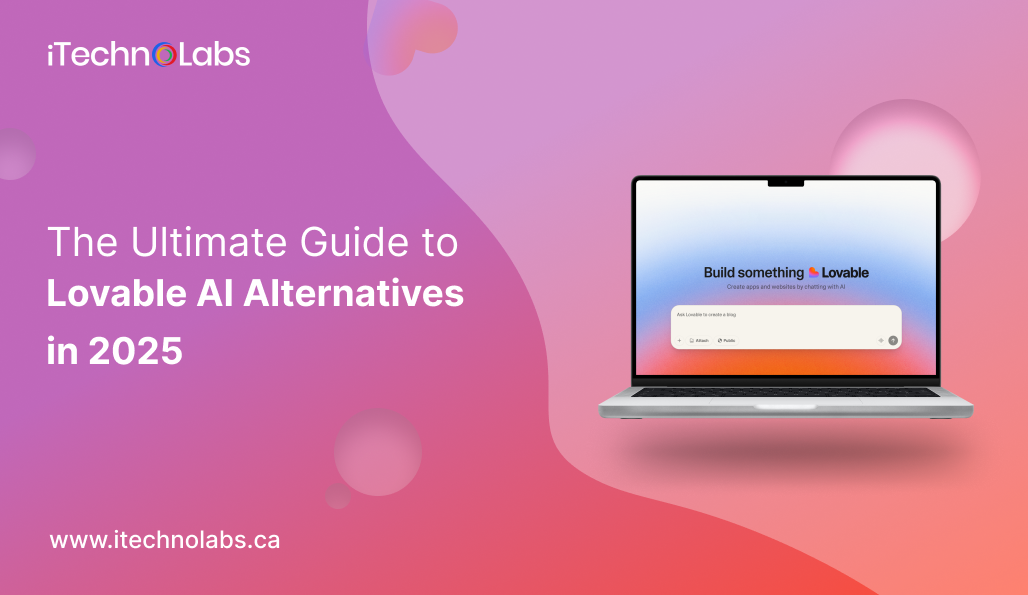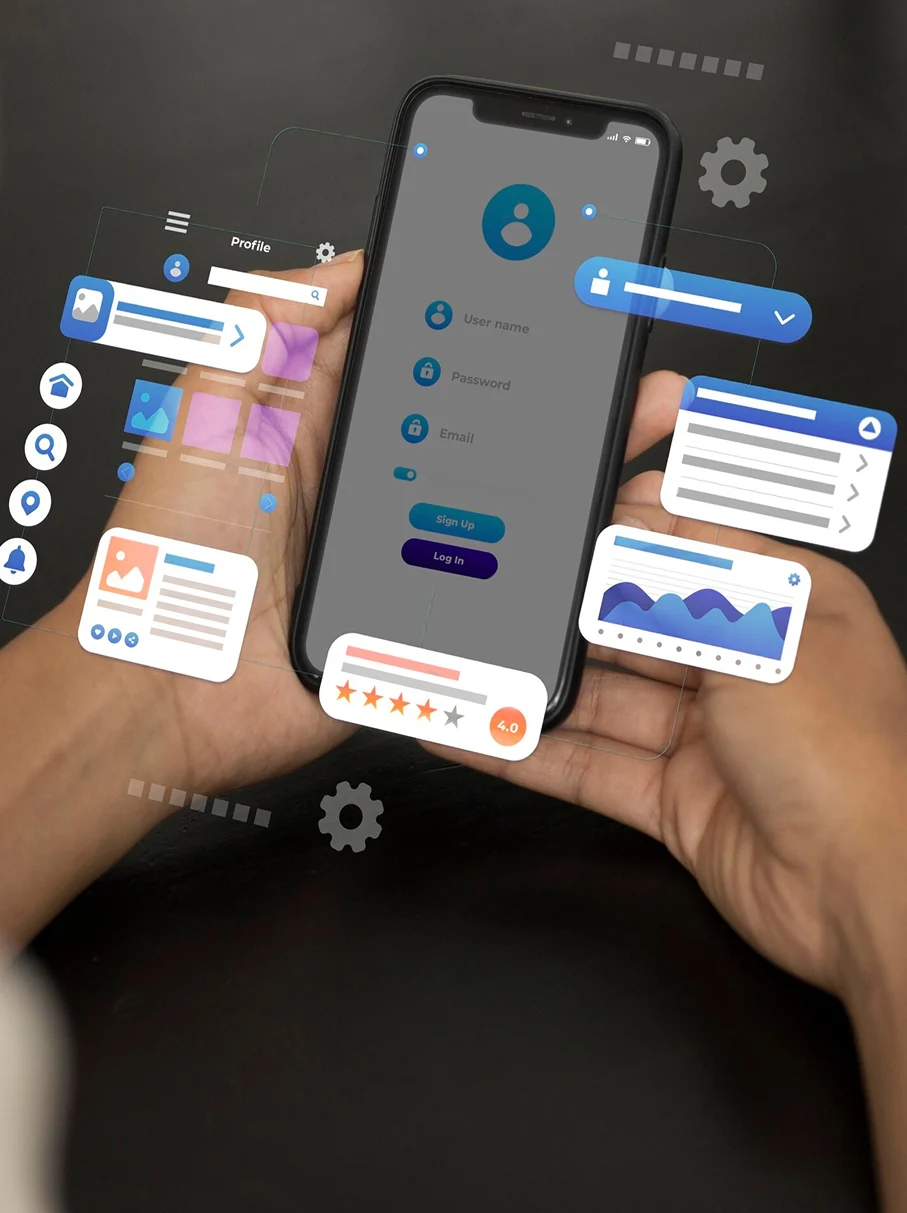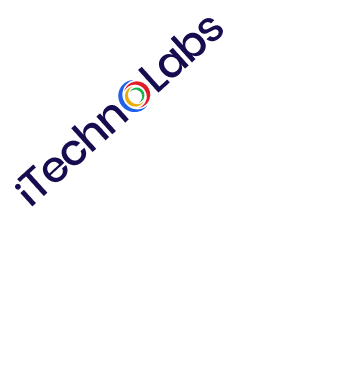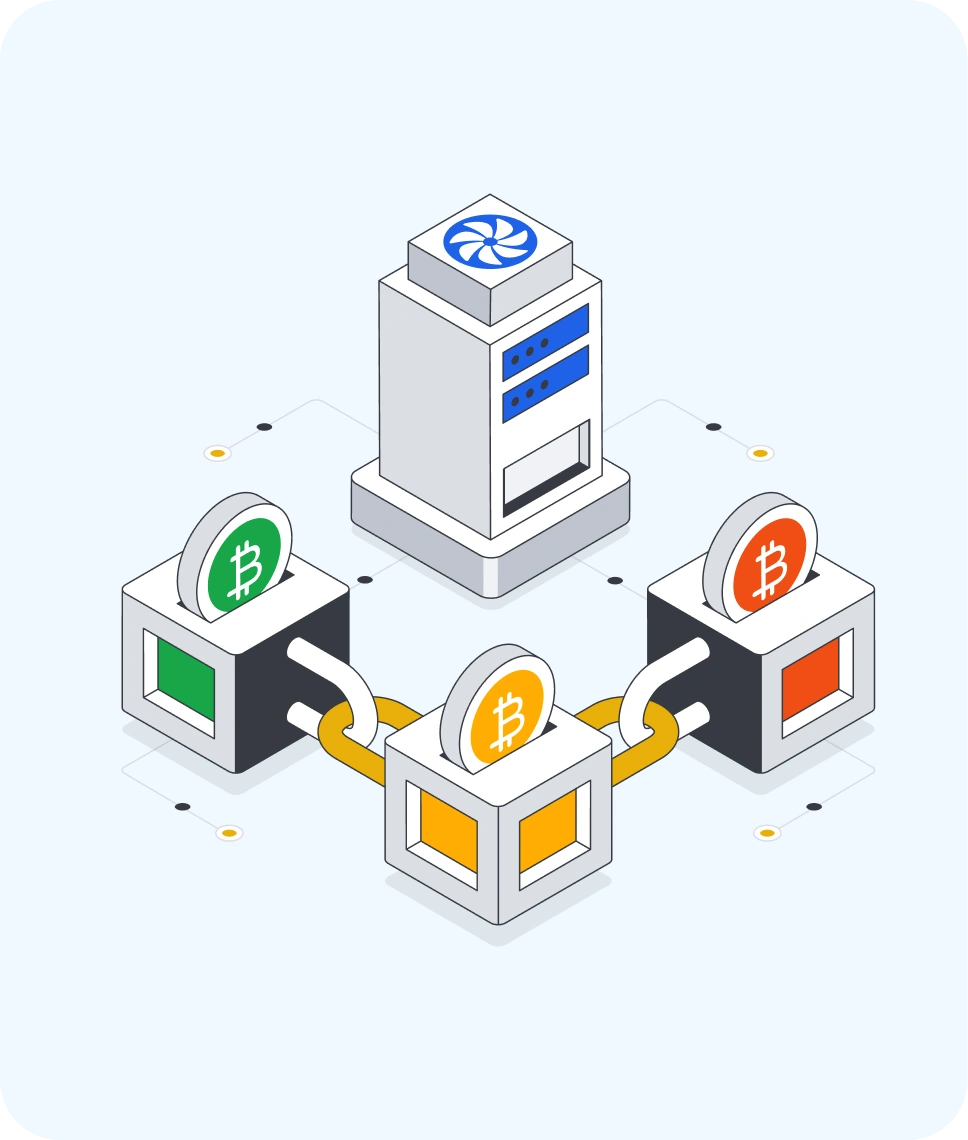Over the years, artificial intelligence has gone to an everyday reality from being a futuristic idea. Now we use AI for writing, designing, coding, customer service and even decisions. One area where AI has had a major impact is app development.
Traditionally, expensive developers require months to create an app or site. But the AI devices have changed completely. They let people say what they want in regular language, and within minutes the tool produces a working version of the app or site.
One of the most popular platforms in this category is Lovable AI Alternative. This is called “lovable” because this app feels smooth, fun and user-friendly. But with some tools, it may not be perfect for everyone. Some people want more optimisation, different prices or unique features that do not provide sweet AI.
This is the place where the idea of a cute AI option comes from. In this guide we will find out what AI is, why people are looking for options and the best option available in 2025. Whether you are a beginner, a small business owner or an ambitious entrepreneur, this guide will help you make the right choice.
What is Lovable AI?
Lovable AI is a modern app-building platform that uses artificial intelligence to turn your ideas into functional applications. Instead of spending months learning programming languages, you can simply type what you want:
- “Build me an app that tracks daily expenses.”
- “Create a website for my photography portfolio.”
- “Design a dashboard where my team can upload and share reports.”
Lovable AI takes that description and creates a working app prototype within minutes.
Who Uses Lovable AI?
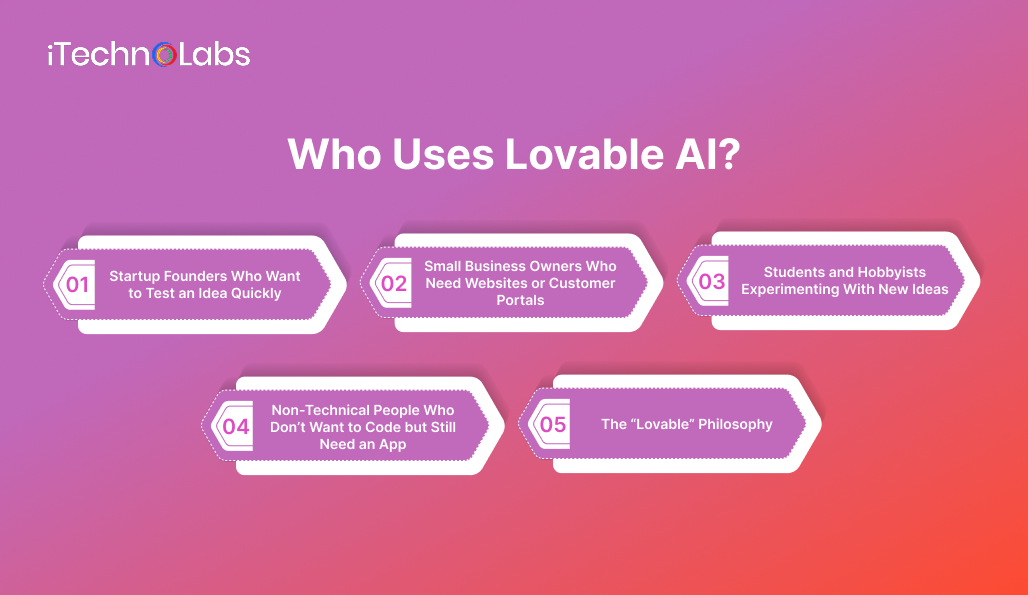
Lovable-style AI devices simplify software production by removing complex coding obstacles. Founders, small businesses, students and non-technical users can quickly change ideas to functional websites or apps. With intuitive interfaces, automation and underlying hosting, these platforms enable fast prototypes, easy repetition and cheap growth, making innovation available to almost everyone.
1. Startup Founders Who Want to Test an Idea Quickly
- Goal: Validate a business concept or Minimum Viable Product (MVP) before raising money or hiring a development team.
- Why Lovable-Style Tools Help:
- Fast prototyping means they can show investors or beta users a functional app in days, not months.
- The underlying templates, hosting and analyses reduce the time spent on infrastructure.
- Less advanced costs compared to hiring full-stack developers.
- Extra Benefit: Iterations are easy; founders can tweak features on their own without waiting for sprint cycles.
2. Small Business Owners Who Need Websites or Customer Portals
- Goal: Establish a professional online presence or create basic digital tools (booking forms, inventory dashboards, loyalty programmes) without large IT budgets.
- Why Lovable-Style Tools Help:
- Drag-and-drop UI and regular linguistic signals remove coding blockage.
- Many platforms include the payment port, CRM and integration with e-post marketing.
- Hosting, SSL and updates are handled automatically and maintained.
- Extra Benefit: Owners can update hours, pricing, or promotions themselves without hiring an agency.
3. Students and Hobbyists Experimenting With New Ideas
- Goal: Learn, explore, and build proof-of-concepts for school projects, hackathons, or personal curiosity.
- Why Lovable-Style Tools Help:
- Free or low-cost tiers fit student budgets
- Instant visual feedback keeps learning fun and boosts motivation.
- Many platforms include community forums and tutorials, helping beginners grow.
- Extra Benefit: Builds a portfolio of real apps or websites valuable when applying for internships or jobs.
4. Non-Technical People Who Don’t Want to Code but Still Need an App
- Goal: Translate an idea or workflow into a working software tool without learning programming.
- Why Lovable-Style Tools Help:
- Natural-language prompts like “Make me an app to schedule volunteers” convert to functional prototypes.
- Wizards, templates, and AI assistants provide guardrails so users can’t “break” the app easily.
- Cloud-based dashboards mean no local setup or complicated installs.
- Extra Benefit: Empowers professionals in HR, events, community organizing, or education to automate tasks and reduce manual work without waiting for IT.
5. The “Lovable” Philosophy
The name “Lovable” signals that app creation should feel:
- Friendly: Clear onboarding, visual builders, and AI hints reduce frustration.
- Fast: Immediate results keep momentum high
- Flexible: Tools adapt to diverse use cases websites, dashboards, forms, mobile apps.
- Empowering: Users leave with a finished product they actually understand and can maintain.
Why Look for a Lovable AI Alternative?
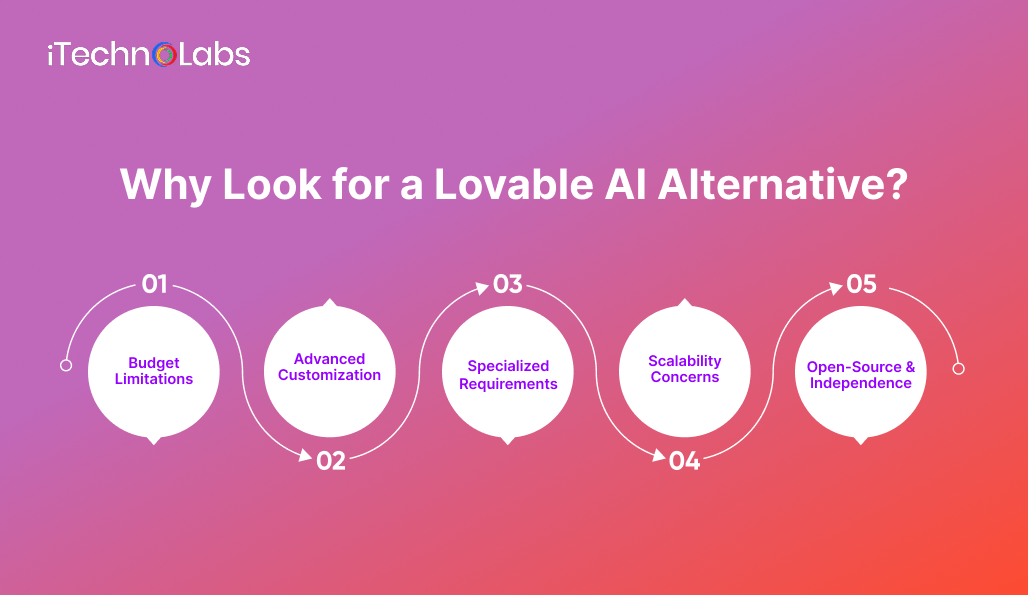
Although the sweet AI is powerful and adapted to the user, it may not fit each project. Prices can emphasise small budgets; some users require deep customisation, others require top functions or cleaner codes, and scaling requirements can continue to limit them. Many people prefer open-source, self-adapted alternatives to maintain freedom and complete control.
Budget Limitations
Lvable AI membership plans can increase the tight budget, especially for freelancers, hobbies or small startups that only require simple features. Monthly payment seems useless for unused functionality. A low-cost or free option lets the creators use, test and start prototypes without heavy advance or long-lasting financial obligations.
Advanced Customization
While Lovable AI’s simplicity is appealing, advanced users often outgrow its guardrails. Developers may crave direct access to source code, deeper API integration, or unique workflows beyond presets. A platform that supports script editing, modular architecture, and backend flexibility offers far more creative freedom for complex or unconventional applications.
Specialized Requirements
Different industries require tailored capabilities: a design-heavy project might demand pixel-perfect drag-and-drop tools, while an engineering startup may insist on exporting clean, reusable code. Lovable AI’s generalized approach sometimes lacks niche functionality. Switching to a tool built for specific verticals can streamline production and prevent frustrating workarounds during growth.
Scalability Concerns
A prototype that works for ten users can fight under thousands. To expand traffic, data and features, apps require strong databases, performance settings and quality security. The cute AI fits the first stages, but companies with high development often migrate to platforms with strong infrastructure, analysis and version checks for long-term stability.
Open-Source & Independence
Some teams prioritise openness, self-esteem and sellers. Option codes for open sources provide complete control over privacy and adaptation and allow developers to tailor all details. They avoid dependence on prices or guidelines for a single company and ensure that projects remain operational and adaptable, even if the commercial platform transforms the direction.
No single AI builder perfectly fits every project or user. Budgets, customization needs, scalability, and personal preferences vary widely. Exploring multiple Lovable AI alternatives helps match the right mix of features, flexibility, and cost. Testing different platforms ensures you find a tool that grows smoothly with your goals and workflow.
Suggested Article: How Much Does It Cost to Train an AI Model?
Popular Lovable AI Alternatives in 2025
Here’s a concise overview of today’s leading, beginner-friendly Lovable AI alternatives. Platforms like Bubble, Replit, Uizard, Create.xyz, Trickle, UI Bakery, and Open Lovable provide diverse tools for building apps, websites, or prototypes. Each balances ease of use, pricing, and flexibility differently, helping creators match their project needs with the right solution.
1. Bubble
Best for: No-Code Startup and Sapor Conditioner Founder
Bubble has been a leader in the no-code area for years. This allows users to create full applications with drag-end-drop interface and workflows. This is perfect for those who do not want to write code, but who still want strong functionality.
- Pros: Strong ecosystem, plugins, scalable apps.
- Cons: Steeper learning curve for beginners.
- Pricing: Free plan available; paid from $29/month.
2. Replit AI
Best for: Learners and developers
Replit is an online development platform enhanced with AI guidance. It supports many programming languages, real-time collaboration, and instant hosting. Ideal for learners and developers, Replit helps you write, debug, and deploy code quickly while gaining hands-on experience beyond traditional no-code tools.
- Pros: Supports multiple coding languages, collaborative tools.
- Cons: Requires some coding knowledge.
- Pricing: Free plan; Pro starts at $20/month.
3. Uizard
Best for: Designers and creatives
Uizard specialises in rapid design and prototyping, turning rough sketches into interactive digital mockups. Simply photograph your drawing, and Uizard converts it into clean screens. Its intuitive interface helps beginners and designers quickly create app or website prototypes without complex tools or coding knowledge.
- Pros: Beginner-friendly, converts sketches to screens.
- Cons: Limited backend features.
- Pricing: Free plan; paid from $12/month.
4. Create.xyz
Best for: All-in-one teams
Create.xyz AI is used to automatically create full application with FrontNnd interface and backand logic. Flexibility is ideal for individuals, small teams and ambitious startups who want to grow rapidly. The user is able to mix, distribute, distribute and repeat easy care, use ease of use carefully with functional abilities to score an application from concept to production.
- Pros: Handles both simple and advanced apps.
- Cons: Paid plans can get expensive.
- Pricing: Free tier; paid from $25/month.
5. Open Lovable
Best for: Open-source enthusiasts
Open Lovable draws inspiration from Cute AI to create an independent, community-in-manipulatory, open-source solution. Open loving developers complete autonomy on codes, hosting and adaptation of software, without membership payments. Open, lovable, and technically designed for loving people; although the layout may take some time, it provides flexibility, openness, and rescue from the boundaries associated with commercial platforms or seller locks.
- Pros: Free, self-hosted, community-driven.
- Cons: Requires technical knowledge.
- Pricing: Free.
6. Trickle
Best for: Entrepreneurs and solopreneurs
Trickle is an all-in-one platform that puts design, signage, controls, applications, landing pages, and forms all in one place. It includes hosting, analytics, and simple workflows – making it the perfect choice for entrepreneurs and small teams that need a fast, affordable, quick solution without complicated code or trying to manage a million different services.
- Pros: Simple, beginner-friendly, affordable.
- Cons: Best for small apps, not large-scale products.
- Pricing: Paid plans from $19/month.
7. UI Bakery
Best for: Business and enterprise users
The UI bakery is a professional platform for professional quality designed for the manufacture of internal business equipment and corporate applications. It integrates workflows by integrating data sources, APIs and user management. With safe hosting, customisation options and automation features, it provides companies the ability to create scalable, efficient software that fits complex operating requirements without heavy coding.
- Pros: Enterprise features, secure hosting, API integrations.
- Cons: Not the easiest for complete beginners.
- Pricing: From $10/user/month.
Key Things to Look for in an AI App Builder
| Feature / Factor | Key Question |
| Ease of Use | Is the platform beginner-friendly, or does it require coding knowledge? |
| Pricing | Does it offer free plans, affordable tiers, or only premium options? |
| Customization | Can you edit the design, backend, or code easily? |
| Scalability | Will the app grow with your business needs? |
| Templates & Community | Does it have pre-built templates or an active user community? |
| Integration Options | Can it connect easily with other tools (APIs, CRMs, payment gateways)? |
| Performance & Speed | Does the platform load quickly and handle heavy traffic? |
| Security & Compliance | Are data protection, encryption, and relevant compliance standards offered? |
| Support & Documentation | Is there reliable customer support, tutorials, and clear documentation? |
| Offline Capability | Can the app work partially without internet or sync when reconnected? |
| Device & Platform Support | Does it support web, iOS, Android, and responsive layouts out of the box? |
| Version Control | Can you manage updates and rollbacks and track changes easily? |
| Analytics & Reporting | Does it provide built-in analytics or integrate with external tracking tools? |
| Automation Features | Can you set workflows, triggers, or scheduled tasks without manual effort? |
| Internationalization | Does it support multiple languages, currencies, or regions for global users? |
By evaluating factors such as ease of use, prices, adaptation, scalability, integration and security, you can adjust the AI app builder with your goals. Comparing features, testing free plans and assessing future development ensures that you choose a sweet AI option that meets the budget, technical skills and long-term project requirements.
Comparison: Which Lovable AI Alternative Fits You?
| User Type | Recommended Lovable AI Alternatives | Why It Fits You |
| Beginner | Uizard, Trickle, BuildGlare | Simple, no-code interfaces designed for easy app design and fast prototyping. |
| Startup Founder | Bubble, Create.xyz, Bolt.new | Great for building MVPs, SaaS apps, and scaling ideas quickly with low costs. |
| Developer | Replit AI, Open Lovable, Roo Code | Offers coding support, flexibility, and advanced tools for custom applications. |
| Business | UI Bakery, Bubble | Provides enterprise-friendly solutions, integrations, and efficiency for teams. |
Each tool has its strengths, so the “best” choice depends on your goals.
Step-by-Step Guide to Choosing the Right Tool
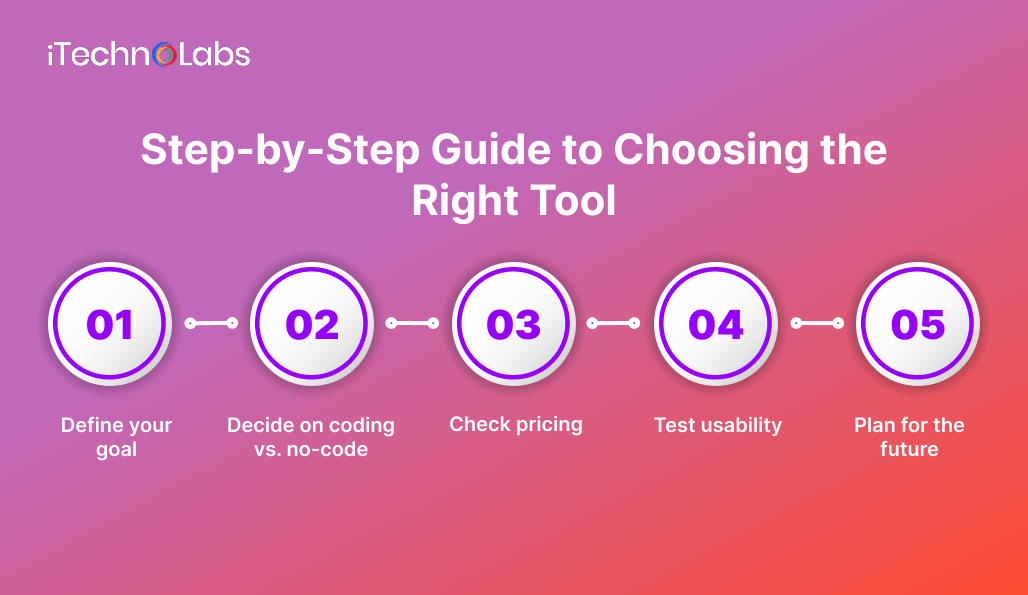
- Define your goal – Do you need a website, mobile app, or business dashboard?
- Decide on coding vs. no-code – Do you want full control or simplicity?
- Check pricing – Compare free trials and monthly plans.
- Test usability – Try building a small project on each platform.
- Plan for the future – Make sure the tool can scale as your needs grow.
The Future of AI App Builders
AI-powered app builders are only getting smarter. In the coming years, we can expect:
- AI agents that not only build but also maintain apps.
- Multimodal design where you can describe apps with text, images, or even voice.
- Lower costs, making these tools more accessible.
- Stronger open-source communities, offering free options.
This means that by 2030, almost anyone could create a fully functional app in a single day without writing code.
Important Article: AI Agent in Customer Service
Conclusion
Lovable AI Alternative has made a major impact by making the development of the app available and pleasant. But this is not the only option. Depending on your requirements, budget and expertise, many beautiful AI options are worth applying.
- If you’re just starting out, tools like Uizard or Trickle are simple and effective.
- If you’re a startup founder, Bubble and Create.xyz give you more flexibility.
- If you’re a developer or open-source enthusiast, Replit AI and Open Lovable give you control.
- For businesses, UI Bakery provides enterprise-level solutions.
The best part? You don’t have to pick just one. Try a few free plans, experiment, and see which tool feels most natural for your workflow.
FAQs on Lovable AI Alternatives
1. What is the best free lovable AI alternative?
Open Lovable suits no-code users, while Replit AI supports coding projects. Both are free, making them excellent options depending on your technical skills and project goals.
2. Can non-technical users build apps with these tools?
Yes. Platforms such as Uizard, Bubble and Srickle enable beginners to design, prototype and launch without coding, making the app creation more accessible to entrepreneurs and creators at all levels.
3. Which alternative is best for startups?
Bubble and Create.xyz are preferred by startups for building MVPs and SaaS solutions. They provide flexibility, scalability, and affordable options to launch products quickly without heavy engineering resources.
4. Are these units completely replacing the developers?
Not quite. AI tools accelerate and simplify growth, but skilled developers are important for the production of complex systems, ensuring safety, managing scaling and long times, and maintaining large projects effectively.
5. What does the future of AI app builders look like?
AI app builders will be smarter, more economical and highly accessible, enabling everyone, despite the technical knowledge of quickly changing the ideas with minimal effort to change functional, professional applications.

